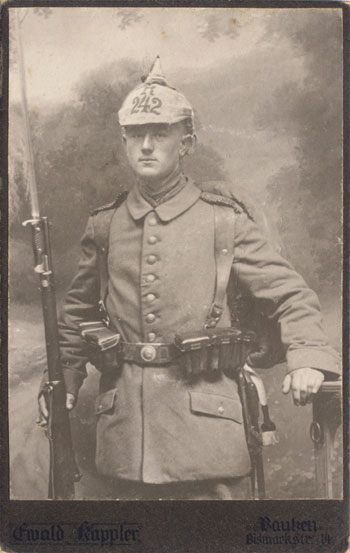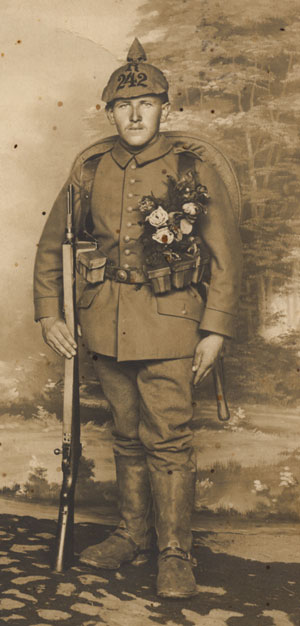RIR 242 was a young volunteer regiment very much akin to the Prussian units of XXVI. Reservekorps whose slaughter a little further north during those same terrible weeks of October and November 1914 would create the legend of Langemarck. In total, four of these green reserve corps would be bled white in the fruitless offensive around Ypres.
The regiment had been raised hastily in August from the depots of IR 102, IR 103 and IR 178, all garrisoned in the partly bilingual Oberlausitz region (home to Saxony's Slavic Catholic minority, the Lusatian Sorbs). Three quarters of the enlisted men were war volunteers, and some of them undoubtedly students - though despite their disproportionate enthusiasm for volunteering, these represented such a small segment of the German population that they were never more than an unusually visible minority even in the few units which they did join en masse. For example Reserve-Jäger-Bataillon Nr.26 (54. Reserve-Division) was much favoured by the students of the Freiberger Bergakademie, but this only accounted for around 160 men of 1000 at mobilisation. The remaining quarter of the 'other ranks' of RIR 242 were older peacetime-trained men of the Landwehr and Landsturm, plus previously untrained men of the Ersatz-Reserve.

It can be assumed that (as was the norm in XXVII.RK) the NCOs were also largely drawn from the Landwehr and Landsturm. As far as officers are concerned, all three of the battalion commanders were retired or semi-retired, though RIR 242 had the considerable benefit of a peacetime regular commander - Oberstleutnant Pudor of IR 178. This was almost immediately lost in the field, as Pudor was snapped up on 21st October by the corps staff (which was trying to improvise the two infantry brigade headquarters per division which it lacked). In Pudor's temporary absence the regiment was led by the senior battalion commander, Oberstleutnant a.D. Max Hammer.
On the afternoon of 21st October RIR 242 was committed from corps reserve at the Menin Road on the extreme left of 54. RD. After several days exchanging fire with the British at Kruiseik, they were committed to an attack on the burning village on the dark and rainy evening of the 25th. According to their regimental history, the artillery preparation was wholly inadequate. Nevertheless despite suffering losses to shrapnel and machine-gun fire on the way in, the Saxons succeeded in storming a trench held by elements of 2nd Scots Guards. The village was then cleared in bitter hand to hand fighting, in which all unit cohesion was lost. Still the defenders clung on to their trenches on the village perimeter despite the threat of encirclement, and counterattacked with two fresh companies a little before 1am on the 26th. Their second attempt forced RIR 242 to abandon most of the ground it had taken, with Oberstleutnant Garten (III./242) among those killed plus (according to the British Official History) nearly 200 officers and men cut off and captured.

Above: The slow and agonising progress of the mixed Saxon / Württemberg 54. Reserve-Division up the Menin Road during the First Battle of Ypres. Although part of the purely Saxon 53. Reserve-Division, RIR 242 was committed from corps reserve to the fighting on the sister division's left flank.

In conjunction with units of 3. Kavallerie-Division on its left, RIR 242 assaulted Kruiseik again on the morning of 26th October after a far more effective bombardment. Acting commander Oberstleutnant Hammer was among the first to die, enraging his men. The 'Lausitzer Garde' (as they would later call themselves) attacked with great aggression, and it was now the turn of the British to abandon Kruiseik in a desperate hurry. Of two companies of the 2nd Border Regt. only seventy men escaped. Two companies of 2nd Scots Guards were entirely cut off as were two platoons from a company of the Grenadier Guards, the remainder of which managed to fight their way out. The British Official History estimates a total of nine officers and 300 men captured, while in its own history RIR 242 claims to have taken more than 400 prisoners including a "regimental commander". Many of the Saxon wounded from the night before were found in the cellars of the village, having been treated chivalrously by the British. As Penther states, his regiment's losses had been grievous - though no daily figures are available. The regimental history states by the time RIR 242 was (very briefly) relieved from the battlefront on the night of 9th-10th November, its fighting strength was down from around 3000 to a mere 380 men; not as low as Penther's figure, but still horrifying.
'Harre meine Seele'
Readers may be surprised to hear that the regimental history of RIR 242 makes no mention of singing by the troops who attacked Kruseik, despite the popularity of this trope as part of the 'Legend of Langemarck' and Penther's striking eyewitness description in an account never intended for publication.
From XXVII.RK more broadly the phenomenon is certainly mentioned in 'Sachsen in Grosser Zeit' (vol.II pp.151-152), wherein Oberst z.D. Baumgarten-Crusius of RIR 245 claims that his immediate subordinate Oberstleutnant z.D. Haeser (I. Batl. / RIR 245) was the first to begin singing 'Deutschland, Deutschland über alles' during the assault on Becelaere on 20th October. He further asserts that not only Haeser's men but by implication also the other regiments participating in the assault followed his example, quoting Hermann Stegemann's 'Geschichte des Krieges' in support of his claim. Having personally taken part in the fighting on the 20th, Baumgarten-Crusius was wounded the following day and invalided out; Haeser himself was killed in action on the 23rd.
A striking difference between Penther's account and the 'Legend of Langemarck' is the choice of song - not patriotic at all, but rather purely religious. 'Harre meine Seele' is a solemn hymn expressing patient trust in God in the face of adversity (and implicitly, the face of death).





